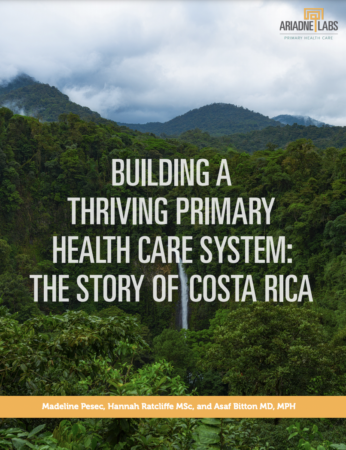Since 2015, Ariadne Labs’ Primary Health Care team has studied Costa Rica’s effective primary health care system and extrapolated the lessons the system offers to the United States and other countries.
These lessons were explored in a Jan. 27th panel, hosted by the Harvard T.H. Chan School of Public Health, with Asaf Bitton, MD, MPH, Executive Director of Ariadne Labs, and Ariadne Advisory Board member Ambassador Román Macaya, former Executive President and Chairman of the Board of the Costa Rican Social Security. Patricia Geli, Executive Director of the Reform for Resilience Commission and Research Scientist at the Harvard T.H. Chan School of Public Health, served as moderator.
This small Central American country has been able to raise average life expectancy from 55 years in 1950 to 81 years today – the third highest life expectancy in the Western Hemisphere. It has an infant mortality rate half the average of the Latin America and the Caribbean region. More remarkably, the country has achieved these successes while spending far less on health care than the U.S. as a share of income.
The lab’s Primary Health Care team, in collaboration with Costa Rican colleagues, has researched and created a series of evidence-based resources that document how Costa Rica achieved this success. This includes a report describing Costa Rica’s history of strengthening the primary health care system; a case study on what other nations can learn from Costa Rica’s primary health care system; and an analysis of primary health care system capacity in the Huetar Atlántica Region of Costa Rica. The team has published research papers on Costa Rica in Health Affairs, Health Policy and Planning, and BMJ Global Health.
A key factor has emerged from Ariadne’s work: Costa Rica has made public health measures directed at the overall health of the population central to the delivery of medical care. In most countries, the vast majority of spending goes to treat individual diseases and ailments. By contrast, public health has been a priority for decades in Costa Rica.
During the Jan. 27 panel discussion, Macaya described Costa Rica’s system of social work and outreach, including home health visits even to extremely remote areas, and the coordination of care through an integrated electronic medical records system.
“None of these results are an overnight phenomenon,” he stressed. “It’s the result of decades of investment, expansion, infrastructure and medical training.” He noted, “Costa Rica has no army. That’s been the case since 1949. So what would have been a military budget was available for social spending.”
The wide discrepancies in life expectancy by race or income as found in the U.S. is not common in Costa Rica. “Costa Rica is one of five countries with a blue zone where a lot of the population lives well into their hundreds and that blue zone happens to be in a relatively poor area,” said Macaya.
Bitton singled out for praise Costa Rica’s systems orientation on public health and its incremental approach. “The question for U.S. local, state, regional and federal policy makers is: Do you want to build a sick care system? Or do you want to build a health system?” he asked. “In the middle, you could build a health care system. But I would argue right now in the U.S. we have a sick care system.”
By contrast, Costa Rica focuses on primary health care with active local teams that feel a proactive responsibility for care for a defined population, inclusive of everyone, regardless of age, race, or economic or immigration status, Bitton said. The attitude is not “I’m going to wait for you to come to my clinic.”
Bitton noted that the partnership between Ariadne and Costa Rica grew out of the lab’s participation in the Primary Health Care Performance Initiative, where it became apparent that “Costa Rica stood out.” Yet this performance was not widely documented outside of Latin America, indeed, Costa Rica was seen as an “outlier.” It became clear Costa Rica made intentional policy decisions in the 1980s, which yielded results in the 1990s and 2000s. Ariadne has sought to bring lessons from that experience to a wider audience.
“It’s been an amazing journey to learn with you and from you,” Bitton told Macaya during the panel.





